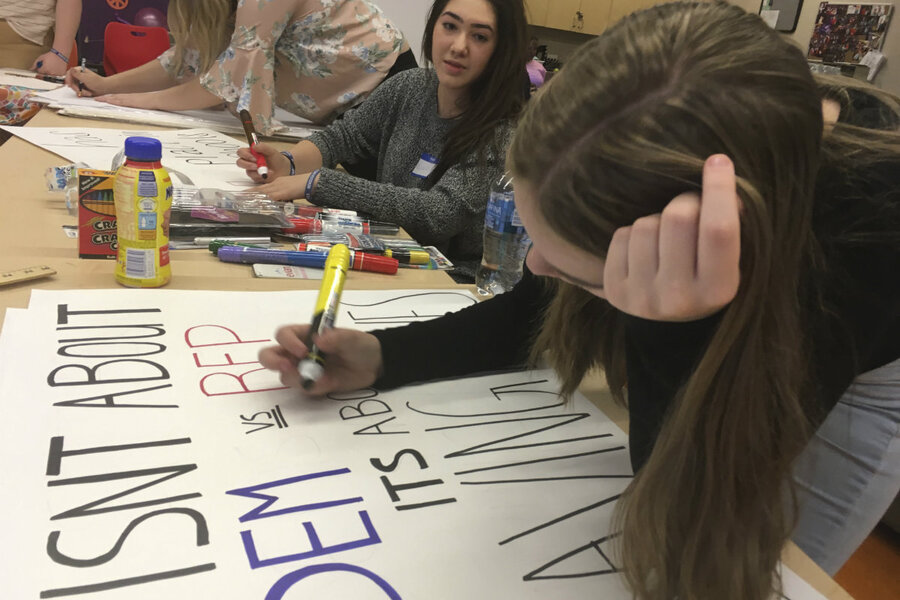Students affected by Las Vegas shooting rally behind Parkland survivors
| Las Vegas
Kaitlynn Willoughby was frustrated by how quickly gun control debates stalled after the worst mass shooting in modern United States history.
Her friend, Quinton Robbins, was among the 58 people killed Oct. 1 at a country music festival on the Las Vegas Strip. By the holidays, just weeks later, calls for change dissipated.
"No one was listening to us yet," the high school senior said. "After Las Vegas, it was just another shooting."
Kaitlynn is among those planning to march this weekend in rallies worldwide inspired by high school students in Parkland, Fla., who turned their own mass shooting last month into a rallying cry.
"The Parkland event allowed us to gain traction," Kaitlynn said. "Those students refused to be silent. They started in Florida and it spread nationwide."
Students from Marjory Stoneman Douglas High School are anchoring a rally against gun violence Saturday in Washington, D.C., with hundreds of other marches set for cities across the globe. The protests follow widespread student walkouts last week, including at schools in Las Vegas, a city still scarred by its own massacre.
Unlike the gambling destination, where many shooting victims were out-of-town tourists, Florida survivors spearheaded large state and national demonstrations and sweeping state gun legislation.
After the Vegas shooting, vigils and "Vegas Strong" rallies filled street corners, but activism for gun legislation was less focused. Efforts in Congress to ban "bump stocks," devices used in the massacre that allow guns to fire like assault weapons, went nowhere. The Nevada Legislature wasn't in session.
Now, students and survivors are joining protests launched by Florida youth and expect as many as 10,000 demonstrators Saturday in Las Vegas.
Shae Turner, who would be marching if she weren't leaving town, escaped the outdoor concert through a hail of gunfire with her best friend. Some of her classmates at Faith Lutheran High School weren't so lucky: Two were wounded as bullets rained down from the Mandalay Bay hotel-casino across the street.
"People that I see every day, they've forgotten," the high school junior said. "They've moved on. We're completely different."
Shae remembers grabbing her friend's hand, ducking behind palm trees during barrages of gunfire, and running to a casino to take shelter until their parents arrived.
"Other kids are passionate about it and will post about it on social media, but they don't understand how it changes your life forever," Shae said of mass shooting survivors. "It's just sad to me, the demographic of teenagers and children having to live a life where they are affected by gun violence."
Unanswered questions about the gunman's motive are certain to be on marchers' minds. The shooter was a real estate investor and high-stakes poker gambler who meticulously amassed assault-style weapons and fired for 10 minutes into a concert crowd of 22,000 people, authorities say. He then killed himself.
Survivor and San Francisco resident Stephanie Wellek said she's overcoming some fears to return to Las Vegas for the first time since the shooting to speak at the event.
"It's partly for healing. I expect tears," she said as she worried about being back in a crowd surrounded by tall buildings. Officials say dozens of police officers and city marshals will monitor the march and rally.
"But this feels good to be expending energy toward a solution," Ms. Wellek said.
Connor Leeming, a high school senior whose campus hosted teach-ins instead of walkouts last week, said some classmates told him their Second Amendment rights are under attack.
"It's not good for democracy when people isolate themselves and are not open to listening to other people," said Connor, who recalled attending the funeral of a classmate's mother who died in the shooting.
Karl Catarata, a University of Nevada, Las Vegas, political science student who has spent weeks organizing student actions at UNLV, high schools and now City Hall, said he felt like he was part of a budding grass-roots movement.
He said the Saturday rally is about enacting comprehensive gun reform at the state and national level and "making sure people who are a danger to themselves and other people don't have access to automatic weapons."
"How audacious is it for kids who are young to be upset that their classmates are dying?" Mr. Catarata asked. "All these students are mobilizing. They're the next generation and the next voters."
This story was reported by The Associated Press.







